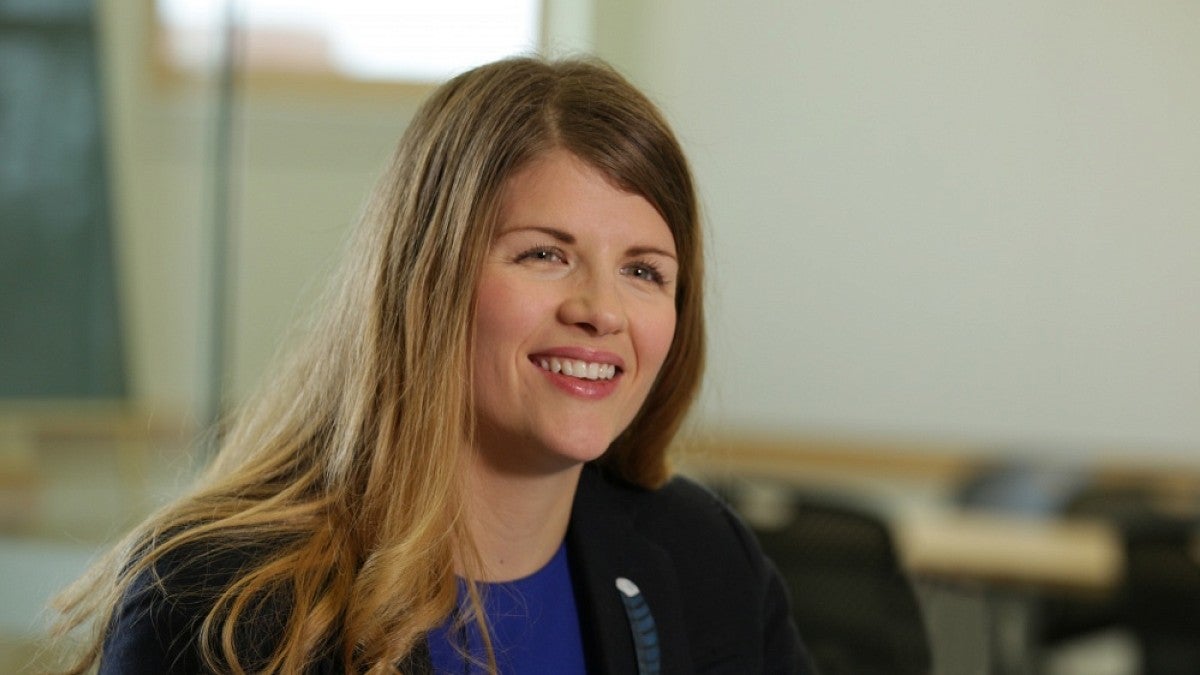Editor’s note: Duck of the Week is a new section in Around the O Workplace that highlights UO employees and their work. Each story features an interview with one employee, in his or her own words, with light editing for clarity and length only.
How long have you worked at the UO?
I’ve been here at UO for 19 months now.
Tell us about your work:
I am an e-learning and open educational resource (OER) librarian, which consists of two main roles. For the e-learning side of my job, I serve as an instructional designer within the library. I advance the library’s presence in online learning and design online learning supports for students.
I also raise awareness about textbook affordability and the need for open educational resources, or OERs. OERs are free and openly licensed course materials or textbooks that can help ensure that all students have access to course materials on the first day of class regardless of their financial situation. I teach workshops and collaborate with individual faculty members, librarians and instructional designers. Beyond that, I am also a liaison between the library department and our statewide OER coordinator to help connect faculty with resources as they transition to lower-cost options for their courses.
When I first joined the UO community, awareness about textbook affordability was fairly low. Interest about this issue is definitely gaining traction now though because students are really invested in it. As librarians, we can’t change tuition costs or student fees, but we can affect the textbook prices by choosing open textbooks or other lower-cost options through the library.
What does your typical day look like?
On the OER side of things, my responsibilities vary day to day. I do a lot of outreach to individual faculty to help them learn more about low-cost alternatives for their courses as well as the cost-based textbooks that they’re currently using. I’m also co-leading a Textbook Affordability Task Force sponsored by the Office of the Provost this fall, where we are working to create a textbook affordability strategic plan for the university.
In terms of e-learning, my job changed quite a bit once we all went remote and students didn’t have access to the physical library anymore. I worked with Information Services and UO Online to create a librarian role within Canvas to help connect students with their subject liaison librarian and make sure that they had the research support they needed within the learning management system. I also worked with a team of librarians to develop a suite of library tutorials for students learning online for the very first time. These videos were designed to help students navigate different library services and resources that they might need throughout the remote learning period.
My job is unique in that I work with everyone, whereas other librarians focus on specific disciplines. I serve the whole university and anyone who wants to transition with lower-cost options. I have worked with the UO Composition Program and other departments who are interested in OER to find low-cost alternatives for traditionally high-cost textbooks.
What do you like about working at the UO?
As someone who is in a brand-new job at the UO, I have to rely on strong relationships across campus to raise awareness about OER and the issue of textbook affordability. With that in mind, I feel incredibly grateful for the wonderful partnerships I’ve created across campus within the library, UO Online, Teaching Engagement Program (TEP), Office of the Provost, and ASUO too. They have been wonderful colleagues to work with and have all expressed support and interest in OER. That’s what I enjoy most—connecting with faculty who are interested in OER, and working with really wonderful colleagues that help amplify this message across campus.
What keeps you motivated?
Students are definitely my biggest motivation since they are the entire reason why my career has been in higher education. Especially during this remote learning period, I empathize with students who are learning online for the very first time and are struggling to make ends meet financially. I believe that the pandemic has only increased the need to focus on textbook affordability because many students are out of work right now, which translates into a significant financial impact. The faculty I talk to often think that books make up such a small part of the overall student cost, but lots of times students choose not to purchase them in order to meet other basic needs like food and rent. Choosing not to purchase a text can have a disproportionate effect on a student’s education, so I am motivated to ensure that they have the best possible learning experience at the UO through equitable access to course materials.
I am also constantly inspired by the students I have interacted with in ASUO. They are such amazing leaders and have made textbook affordability and OER a priority this year. That’s been really cool to see, and I feel really grateful that I get to partner with them on that.
What is something people may not know about you?
When I came to Oregon five years ago, it was actually for a job at Oregon State University as an instructional designer and instructional design manager. My husband is also a professor of history at Oregon State, so we’re kind of a divided house. I started out as a Beaver and then later became a Duck, so that might make me a platypus!
Rayne Vieger is part of UO Libraries.
Do you know someone who should be Duck of the Week? Nominate a UO employee.


